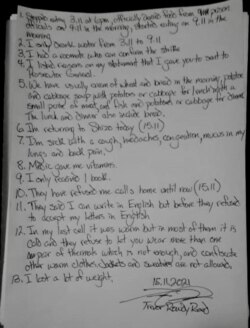Editor's Note: An update is appended at the end of this fact check.
On November 9, the family of Trevor Reed, a former U.S. Marine held in Russia, told the media that he had begun a hunger strike to protest his detention and treatment in a Russian jail.
The Kremlin declined to comment, Reuters reported.
The Russian Federal Penitentiary Service denied that Reed wasn’t eating, telling the state news agency TASS: “The information published in the media about the inmate Trevor Reed’s hunger strike does not correspond with the reality. He did not address a statement declaring a hunger strike to the administration of the facility, he is taking food according to the daily schedule.”
That claim is false.
Reed’s lawyer, Victoria Buklova, told Polygraph.info by phone from Moscow that her client informed Russia’s Prosecutor General and prison authorities in a formal complaint that he would begin the hunger strike on November 4.
“We have no reason to doubt that Trevor will keep his word, but since the Russian prison administration is denying that he went on a hunger strike, we sent a local lawyer in Mordovia to see him in jail and get a sworn statement confirming that he is in fact on a hunger strike.”
Reed, 29, served in the White House presidential guard during President Barak Obama’s administration. He was arrested in Moscow in 2019 for allegedly causing a public disturbance while drunk.
In 2020, a Moscow court convicted Reed of attacking two police officers while he was being arrested and sentenced him to nine years in confinement. Reed denied the accusations and pleaded not guilty.
The police officers who arrested Reed in 2019 testified in the court that Trevor endangered their lives by attacking them while inside their police car and causing them to lose control of the vehicle, risking a crash.
But Reed’s lawyer, Buklova, said the case against Trevor was fabricated and that the charges against him were bogus. “The prosecution failed to prove his guilt while the defense presented solid facts proving Reed’s innocence,” she said.
Buklova said there is evidence discrediting all the charges against Reed, including medical exams right after the arrest showing “he was not in a condition to attack anybody because he was in a state of acute alcohol poisoning and needed to be taken to a hospital rather than a detention center.”
The police car that transported Reed to prison after his arrest “was equipped with inside and outside video and audio recorders, but when we requested those records, the prosecution failed to provide them,” Buklova said. Footage that the defense obtained from street-level surveillance cameras showed the police car driving steadily in its lane without any shifts or turns.
At his sentencing, Reed told the Moscow court that his case was political and denied the charges.
“I understand that in this country pleading guilty may lead to you getting a shorter sentence,” he said. “But I think it would be unethical and immoral to plead guilty to a crime that I truly believe I did not commit. And if I’m going to be given a prison sentence, I would rather stay in prison an honest man than walk free tomorrow a liar and a coward.”
In August, Reed was transferred to a jail in Mordovia in eastern Russia. His family and lawyers said he is being kept in an isolation cell for extended periods and that the conditions in his prison cell there are inhumane.
Reed has not been allowed to communicate with his family in Texas for more than three months. The hunger strike, his family and lawyers said, is to protest his detention and the violation of his rights.
According to Russia’s foreign ministry, Reed is one of 17 Americans currently imprisoned in Russia.
Among the others is Paul Whelan, a former U.S. Marine accused of spying and sentenced to 16 years in prison. Whelan has denied charges and said he was a “victim of a political kidnapping.”
U.S. President Joe Biden and Russian President Vladimir Putin discussed the topic of prisoner exchanges during their summit in Geneva in June, a month after Biden called on Russia to release Reed and Whelan. However, neither Biden nor Putin provided any details about their discussion of this issue.
The U.S. Embassy in Moscow has called the charges against Reed and Whelan absurd and demanded their immediate release.
Update: In a statement given on November 15 to a local attorney at the Mordovia jail, Trevor Reed wrote that he stopped taking food on the evening of November 3 and continued a hunger strike for five days until November 9.
Trevor’s father Joey Reed confirmed to Polygraph.info that the statement is authentic and in his son’s handwriting. He also authorized VOA to publish a copy. As such, we have updated our verdict to false.
Joey Reed said that according to lawyers in Russia, less than a week after the hunger strike authorities moved his son back into a solitary confinement as a punishment for refusing to work in a labor camp.
“He was sick. He never received any medication other than vitamins and an occasional ibuprofen,” Joey Reed said. “He was allowed to call his girlfriend in Russia. He still is not being allowed to call us.”
Since the hunger strike, Trevor Reed has been given only one of the many books the U.S. Ambassador to Russia brought for him two months ago. “He was told he will never receive any other books,” Joey Reed said.
Ambassador John Sullivan visited Reed in a Moscow prison in August before his transfer to Mordovia. Reed's detention is a “mockery of justice,” Sullivan said.






